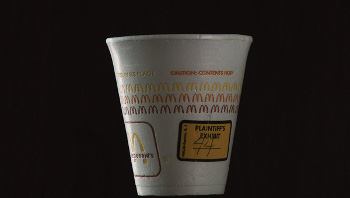 Back to selection
Back to selection
“HOT COFFEE” DIRECTOR SUSAN SALADOFF

No political season is complete without politicians taking up the case of tort reform. Greedy litigants are blamed for everything from clogging up our justice system to running up our medical bills as tort reform advocates take advantage of the fact that everyone hates a lawyer until they need one.
With so much misinformation out there, what’s a lawyer to do? Well, if you’re Susan Saladoff, longtime lawyer, first-time filmmaker, you pick up a camera. Using the infamous “McDonald’s coffee case” as her prime example, her debut feature, Hot Coffee, investigates how and why corporations spend millions of dollars drumming up support for tort reform — and how the media completely mishandles the story.
I recently spoke to Saladoff, a passionate and ardent advocate of our civil justice system, about her film and its upcoming Sundance debut.
Filmmaker: Which came first for you, this topic or the idea of making a film?
Saladoff: What came first was my desire to share my knowledge about the civil justice system. It wasn’t just the McDonald’s case. I use that as a springboard to tell a much larger story about how people are giving up their rights to access the court system without knowing it.
Filmmaker: One of the reasons I wanted to interview you is because I remember a few years ago being absolutely stunned by the facts of the McDonald’s case — about how badly injured the woman was, and how completely at odds it was with the media portrayal.
Saladoff: I think the McDonald’s case is the most infamous case in the world. When I was interviewing people on the street, almost everybody I talked to knew about it. I interviewed people in India and Russia, and they all thought it was a ridiculous law suit. They didn’t understand how a woman could spill coffee on herself and win millions of dollars. It’s the one case that’s used as a poster child, but when people see the facts and see how bad the injury was and see the documents from McDonald’s about how many times they’ve paid out for having their coffee too hot… The media portrayed that case completely wrong. Jane Pauley said she was driving the car, which she wasn’t.
Filmmaker: How did you go about choosing stories to profile?
Saladoff: I have four character-driven storylines. Each one of these cases is an extreme situation, like the story of Jamie Leigh Jones, the young woman hired by Haliburton to work in their IT department in Iraq. She was promised she’d live in housing with two women, and she was put in a dorm with 400 men and subsequently raped… She’s never been able to access the courts because she signed a contract that had a mandatory arbitration clause…. I am using her horrible story to show how people are giving up their rights because these mandatory arbitration clauses [contract terms that prevent conflicts from receiving judicial attention] are in almost every contract. They’re in everything — mortgages, cell phone [contracts]…. People can relate to Jamie, but the story is really about the mandatory arbitration clause.
Filmmaker: How did you end up in filmmaking?
Saladoff: I was a trial lawyer, almost exclusively medical malpractice. In 2001, I had a severely injured client. She had lost all of her short-term memory, but when you met her, you knew something was off, but there was no way you could understand the extent of her injuries. So, I got old footage of her, interviewed her friends and made a 46-minute documentary that I used in the case so the jury would understand the extent of her injuries.
Filmmaker: One thing trial lawyers do is tell a story —
Saladoff: As a lawyer, my cases were long, complicated cases. I would have to tell a story through witnesses and exhibits. So, basically, I took the skills I had as a trial lawyer and used them to make a film. The people who are my characters are my clients, my experts are my expert witnesses, and my archival footage is my exhibits. I surrounded myself with experienced filmmakers, my DP, my editor and my archival team, but I had a vision of what the story was and how best to tell the story. I knew how to ask questions of my experts, and I knew when I got the information I needed to make my point.
Filmmaker: Did you worry about balance?
Saladoff: I was really careful to keep some kind of balance. Of course I have a point of view, and I made the film to advance that point of view. I’ve seen films where I was confused as to what the filmmaker wanted me to come away with, so I wanted to be clear. It’s a point that very few people have made. The corporations and the media have spent so much money getting out their message. No one understands the other side of the issue until they’ve tried to access the system and discovered they can’t. I have a point of view, but I wanted to present it in a relatively balanced way, so I tried to interview people on the other side. I asked Karl Rove and Newt Gingrich and the Better Business Bureau to be in this film. They all declined, but I was able to get the general counsel of the tort review foundation, and I was able to interview a physician. I tried to get other views into the film, but really, you’ve already heard the other side.
